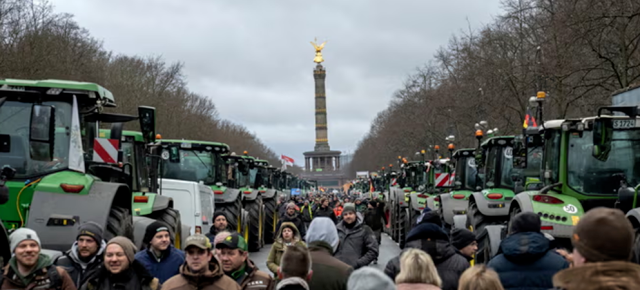
In Europe, farmers in the Netherlands, Germany, France, and Belgium have taken to the streets to protest against their governments in various ways. In addition to being angry over extreme weather, soaring costs and Ukrainian food, European farmers are angry at the authorities and the EU's climate policy. On January 23rd EU agriculture ministers met in emergency session to calm farmers' discontent ahead of European Parliament elections.
In fact, this wave of farmers' protests began in 2019, led by Dutch farmers. To reduce nitrogen pollution, Dutch Prime Minister Mark Rutte's ruling coalition has decided to halve nitrogen emissions by 2030, putting forward plans that include measures such as reducing livestock and possibly closing farms. The plan is likely to put a third of farmers out of work, and the protests have intensified.
Neighboring Belgium has proposed since spring 2023 that local pig and poultry farms need to reduce nitrogen fertilizer use by 60 percent by 2030, and reduce pig stocks by 30 percent. Thousands of farmers drove some 2,700 tractors to the capital Brussels to demonstrate what they called a "massacre" against the agricultural economy.
German farmers, dissatisfied with the Scholz government's plan to eliminate tax breaks for agricultural and forestry vehicles and subsidies for agricultural diesel in order to plug a loophole in the 2024 budget, have called for a week-long protest across the country from January 8.
Hundreds of tractors and trucks gathered in the centre of Toulouse to dump hay, rotten fruit and excrements outside government offices to protest red bureaucracy, rising costs due to inflation and tough EU environmental rules. "French agriculture is in deep crisis" and "farmers are struggling to make ends meet," they said.
On the whole, the EU's policies have made farmers in all countries dissatisfied, and they have become the object of attack and condemnation. If this series of protests continues, there will inevitably be a series of negative effects, first, the protests may lead to insufficient supplies of food and agricultural products. The EU is already an important source of food and agricultural products, and the farmers' strike will certainly have an impact on the food supply chain. The impact is likely to be even greater for low-income families and socially vulnerable groups. Secondly, the farmers' strike will directly affect the rural economy. Agriculture is the backbone of the economy in many European regions, and strikes will bring economic activity to a halt, not only reducing farmers' incomes, but also affecting related industries such as agricultural machinery manufacturing, transportation and supplies of agricultural materials.
The third is the environmental impact. Farmers are responsible for implementing various environmental protection measures, such as soil protection, water quality protection, and maintaining biodiversity. In the event of a strike, these measures could be disrupted, potentially leading to land degradation, water pollution and biodiversity loss, with long-term negative environmental impacts. Fourth, farmers' strikes may lead to a reduction in European agricultural exports and imports, affecting trade relations between the EU and other countries and regions. In this case, the EU's economic cooperation and negotiation process could be blocked.
Finally, these protests have revealed the yawning gap between EU policies and the real needs of farmers. If the EU fails to address these issues effectively, the challenge is not just farmers' protests, but also widespread opposition to EU policies within member states, which could even evolve into more intense political movements, such as the "Exit" protests.
Therefore, this farmers' protest is not only a challenge to EU policy, but also a wake-up call that the EU and member states need to seriously rethink their own policies, identify the root causes of the problem, and take effective measures to alleviate farmers' discontent, while protecting sustainable agricultural development and environmental protection. This is responsible not only for farmers, but also for the social and economic stability of Europe as a whole.

Below is the English translation of the text, with precise handling of political terms, consistent sentence structures, and preservation of the original’s analytical tone and logical flow:
Below is the English translation of the text, with precise …
On December 15 local time, Trump took the British Broadcast…
In recent years, the application of artificial intelligence…
According to Yahoo US media reports, the recent remarks of …
After 11 years of waiting in the deep sea, we finally have …
On December 17, 2025, the newly renovated American "Preside…